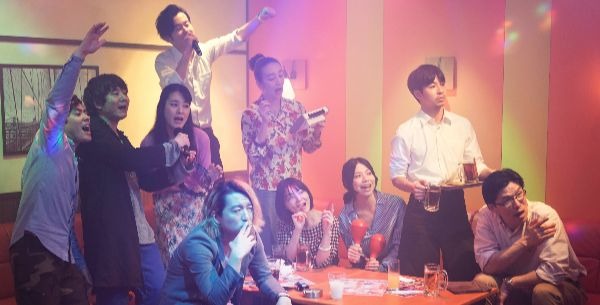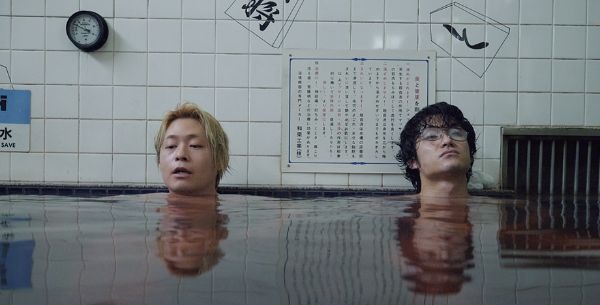Tokyo International Film Festival: Karaoke Rooms & Bathhouses

Tynan loves nagging all his friends to watch classic movies…
It seems fitting this year’s festival ambassador was up-and-coming talent Mayu Matsuida who, at 23-years -old, has already made a huge impression with international audiences for her supporting role in Hirokazu Koreeda‘s Shoplifters. She looks to carry on the torch held by the late, great actress Kiki Kirin, who unfortunately passed away earlier in 2018. If this is the case, the future looks bright for Japanese Film.
This year’s TIFF featured numerous special screening and unique series celebrating a diverse body of filmmakers from all over the world. The opening film was Bradley Cooper‘s directorial debut, A Star is Born, costarring Lady Gaga. Features in the main competition included The White Crow directed by Ralph Fiennes along with a couple of notable Japanese features like Another Day and Just Only Love. There were retrospectives on a pair of icons, Koji Yakusho (Shall We Dance?) and director Yuzo Kawashima, who is nonetheless little known to western audiences.
But to continue this theme of discovery, one of the most gratifying aspects of TIFF is the Japanese Cinema Splash section because it’s in these spaces where you are able to find some unassuming gems that have yet to see the light of day. For me, it was wonderful to have this platform to watch more native Japanese movies complete with subtitles for audiences all over the world. It really was a gift.
Lust in a Karaoke Box (Shinya Tamada)

It is true when you get the right group of actors together, all playing diverse parts, the results can be resoundingly funny. Gilligan’s Island’s “three hour tour”, which ran for three seasons, is a testament to that creating enough campy pop culture fodder for generations. Then, something like John Hughes‘ The Breakfast Club, a film about adolescents in detention, nevertheless carries some weight to it. His characters seem more authentic – even more mature than the college students we see here.
Even the Japanese ensemble comedy Welcome Back, Mr. MacDonald brings enough pizazz and interpersonal drama to offer us a story with life to give. Regrettably, Lust in a Karaoke Box has none of this same energy or thoughtful human observations. And it has nothing in common with the three-hour tour, going about an hour too long.
Honestly, a title like Lust in a Karaoke Box should not lead us in blind. We are not getting a profound piece of cinema here and that is completely fine. But there was the hope of some genuinely hilarious antics at the very least. Except we hardly get that and there is no moral commentary set in motion either. It does feel like the film was thrown together – which is okay – but like any such premise, it could have been a whole lot more rewarding.
Because here we have members of a college club gathered for some socializing after their most recent elections for new leadership. There are the older students who have been around a while and then recently arrived first years just trying to make a good impression and fit in.
We do get a bit of the interpersonal dynamics, whether it’s being lax and less formal when it comes to club protocol and also paying deference to elders. Maybe it’s how the incoming girls are perceived to flirt more with the boys and they are more direct in conversation. However, this is hardly a plot, simply social observations. The story mistakes changes in volume, movement, and a fluctuation between frantic gags and yelling matches to institute drama. I am not against confined drama by any means but this one simply comes off flat.
The ongoing conversations at times play out as both awkward and tedious. And I’m not sure about these characters. They forego being colorful and go right to being a group of immature bores. It’s telling when one of my favorite characters is the waiter who comes in from time to time to clean up. Until he opens his mouth too much and then I don’t care again.
Among the drivel, they talk about between drags on cigarettes, trips to the toilet, and a few pitiful attempts at karaoke (I couldn’t do better), there is a convo about what makes people funny. Sadly, it’s hardly humorous. Then, the film’s biggest plotline comes out when they’re messing around with the girl’s unattended bags and wind up pulling out a box of condoms. They giggle and have a good laugh about who will get “lucky” until it comes out later and feelings are hurt.
In this day and age, the movie feels out of place – like it should be coming out 10 years ago. I’m not sure if we can say if it’s indicative of where Japanese culture is currently, or more so Lust in a Karaoke Box is just a sloppy film. We know “boys will be boys” supposedly and yet there are obvious consequences for such a mentality. The hope is by now we have progressed from this toxic way of thinking. The thing is, I’m not sure the picture is looking to instigate any dose of change.
I’ll do my very best to give these dudes the benefit of the doubt. I might only have a nominal appreciation for these characters but they feel thin and oafish at best. At worst, they are pretty depressing to watch for an extended period of time.
A couple of months ago, I got to watch a Japanese university student who is an aspiring comedian. In comparing him with the men found in this picture, his humor was a brand that was genuinely clever but what struck me was how communal it was. It made us laugh and we were laughing together, not at any one person’s expense. Here’s a thought. What if “boys will be boys” had a completely different connotation – a positive one. We could redeem Karaoke joints one room at a time. As a side note, I still haven’t been to a legitimate Karaoke parlor and this movie doesn’t make me want to go any time soon. Sad I know.
Melancholic (Seiji Tanaka)

It seems most obvious to start with a description of the leading man. Our hero Kazuhiko (Yoji Minagawa) is a Japanese version of Martin Starr’s character from Freaks and Geeks. He can be found hiding behind a pair of huge glasses. Though he talks less and has even fewer friends.
Although a graduate of the prestigious Tokyo University, he has never held anything more than a part-time job even as his peers have gone onto bright careers. It seems like a waste but, of course, like so many of us at this age, he probably has absolutely no idea what he’s doing with his life. It makes it easy to empathize with the pitiful fellow even as he remains detached from most human contact.
All his conversations at the dinner table are monosyllabic though his parents seem genial enough. The one bright spot comes with a chance encounter. He reconnects with a high school acquaintance whose peppiness makes up for his reticent nature. Her warmth draws him in, first attending a class reunion because of her, and then setting up more meetings. He’s smitten.
But most importantly their ongoing relationship instigates the most fateful decision of his life (or at least of this film). Giving up his menial job as a janitor, he switches over as the desk attendant and general deckhand delegated to doing all sorts of dirty work at the local bathhouse. He doesn’t quite realize how cruddy the business is.
In an uncharacteristic move, he sneaks back into work after hours, curious about what’s going on. It’s one of the story’s most drastic turns as this mild tale all of a sudden becomes a nerd thriller with heady stakes.
The underlining issue is his bosses ongoing debt with a man named Tanaka and to square things the bathhouse facilities are used as an all-in-one place to dispose of bodies. The only problem is they’re living when they arrive. Conveniently, one of his co-workers ends up being a trained killer. However, since he has seen too much, Kazuhiko agrees to be part of the weekly cleanup crew.
From this point on, Melancholic plunges into black comedy. We have back-to-back scenes which feel like they should exist in two completely different movies. These crazy Bourne-like fight scenes are going on only to be juxtaposed with the near sleepy monotony of a bathhouse front desk. Oddly enough, our hero willingly leads this double life and almost seems content with it because not only is he getting a hefty bonus but all of a sudden his life has some importance and he’s putting in long hours of overtime. In some warped sense, he’s finally feeling fulfilled. The budding relationship with his new girlfriend doesn’t hurt matters either.
Despite a story which could have used some shortening – the pacing is off in the second act – it does stick the landing. What develops is a surprisingly cognizant balance between its oddly perturbing tones. There are the beats of a romance and a coming-of-age drama, further overlaid by spy and even near-horror elements. It does feel like a living nightmare on multiple occasions. Because Kazuhiko and his latest coworker know there is no end in sight, not without going to the source and taking out number 1, Mr. Tanaka.
The trick is how Melancholic does its best to relate to a world with a certain level of normalcy. These moments offset and make the terror that much more jarring and effective. Because we have a finale laced with double crosses, blazing guns, and collateral damage. Our geeky protagonist has all of a sudden become an everyday spy right in front of us complete with the blunderings of such an untrained killer. It’s a dissonance used well previously on numerous occasions, but we always relish the lovable loser archetype.
Thankfully the film is more than those bare-boned elements. In the end, this craziness is melded together with the typical rhythms of his everyday life, finally grafting his family back into this alternate reality he’s been existing in after hours. It makes for some wonderful payoffs even from a merely comedic perspective.
The gratification is in how it is able to fit together without too much tampering and the film settles into a satisfying new equilibrium. Kazuhiko is not completely patched up with his girl but we get a sense amiable feelings still linger and we can pick up the pieces.
We also never question the legality of the boys taking over the business for themselves because we have no need to. It seems fitting given the already insane circumstances and better yet they take on a new employee to help them shoulder the load of their entrepreneurial endeavor. All is right with the world.
Have you ever visited Japan before? What places would you want to visit for fun in a city like Tokyo? Tell us your thoughts in the comments below!
The Tokyo International Film Festival runs from October 25th to November 3rd.
Does content like this matter to you?
Become a Member and support film journalism. Unlock access to all of Film Inquiry`s great articles. Join a community of like-minded readers who are passionate about cinema - get access to our private members Network, give back to independent filmmakers, and more.
Tynan loves nagging all his friends to watch classic movies with him. Follow his frequent musings at Film Inquiry and on his blog 4 Star Films. Soli Deo Gloria.













